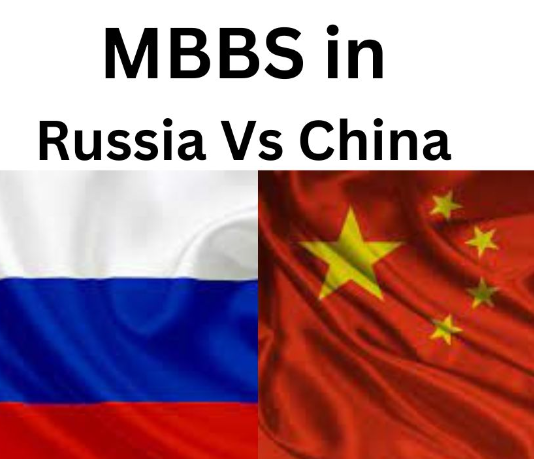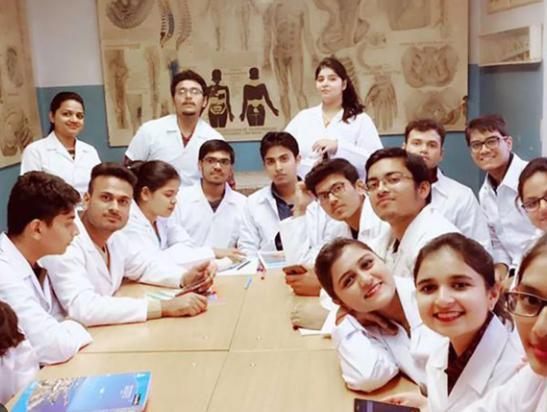Choosing between Russia and China for MBBS depends on personal preferences, budget, and career goals.
Table of Contents
Overview of MBBS Programs in Russia
Quality of Education
Medical schools in Russia typically offer a six-year full-time MBBS program, emphasizing the integration of basic medical knowledge and clinical skills. Students start clinical rotations in their third year, getting exposure to real medical environments.

Cost of Education
The cost of MBBS programs in Russia is relatively economical, with average annual tuition fees ranging between $2,500 and $6,000. Living expenses are also comparatively low, averaging about $200 to $400 per month, depending on the city and lifestyle.
Overview of MBBS Programs in China
Quality of Education
Chinese MBBS programs emphasize a balance between theory and practice, with many courses offered in English. Medical schools in China typically provide a five-year MBBS study plan, followed by one year of internship. Some top medical schools in China also enjoy high international acclaim.
Cost of Education
The average tuition fee for studying MBBS in China is about $2,000 to $5,000 per year. Living expenses can vary, but they are generally in the range of $300 to $500 per month, depending on the city and personal lifestyle.
Each country offers unique advantages, whether it’s the cost-effectiveness of Russian programs or the modern facilities and international focus of Chinese medical schools.
Admission Criteria and Process
Russia
- Academic Requirements: Applicants must have completed their secondary education with good grades in science subjects, particularly in Biology, Chemistry, and Physics.
- Entrance Exams: Some Russian universities may require a university-specific entrance exam.
- Language Proficiency: While many programs are offered in English, some may require proficiency in Russian. Students might need to pass a language test or complete a preparatory Russian language course.
- Age Limit: The typical age limit for applicants is 17 to 25 years.
- Medical Check-Up: Candidates must pass a medical examination to prove they are medically fit.
- Application Process: The application process usually involves submitting an online application, academic transcripts, a medical certificate, and a passport copy. Some universities may conduct interviews.
China
- Academic Requirements: Applicants should have completed high school with a focus on science subjects, achieving a minimum of 70% in Biology, Chemistry, and Physics.
- NEET (for Indian Students): Indian students are required to qualify the NEET exam for admission to MBBS programs in China.
- Language Proficiency: For English-taught programs, proof of English proficiency (like IELTS or TOEFL) might be required. Some universities offer courses in Mandarin, necessitating proficiency in the language.
- Age Limit: Candidates should be between 17 and 26 years old.
- Medical Examination: A comprehensive medical examination is mandatory for all applicants.
- Application Process: The application process involves submitting the application form along with academic records, a health certificate, and a non-criminal record certificate. Some universities may require additional documents.
Quality of Medical Education
The quality of medical education in both Russian and Chinese medical universities is high, with a strong emphasis on integrating theoretical knowledge with practical skills.
Teaching Methods in Russian Medical Universities
Russian medical universities focus on a comprehensive approach to medical education. This includes:
- Extensive Theoretical Training: Courses cover a wide range of medical and biological subjects, ensuring a deep understanding of medical sciences.
- Practical and Clinical Training: From the early years, students engage in hands-on training through simulations, laboratory work, and patient interactions.
- Research Opportunities: Many universities encourage students to participate in research, fostering a culture of innovation and scientific inquiry.
Teaching Methods in Chinese Medical Universities
Chinese medical universities blend traditional Chinese medicine with modern Western practices. Key aspects include:
- Integration of Western and Eastern Medicine: Unique to Chinese medical education, this approach provides students with a broad perspective on different medical practices.
- Emphasis on Clinical Skills: Practical training is a significant part of the curriculum, with students spending considerable time in hospitals and clinics.
- Technological Integration: Advanced technology and digital tools are often used in teaching, enhancing the learning experience.
Cost Analysis
A critical aspect for students considering MBBS programs abroad is the cost analysis, which includes both tuition fees and living expenses. This analysis provides a detailed comparison between Russia and China.
Tuition and Living Expenses in Russia
Russian medical universities offer an economical option for MBBS studies. Tuition fees vary between $2,500 to $6,000 per year, depending on the university and the specific program.
Living Expenses:
The cost of living in Russia can be quite affordable, with an average monthly expense ranging from $200 to $400. This includes accommodation, food, transportation, and other personal expenses.
Students often find that living in smaller cities is more budget-friendly than in major cities like Moscow or Saint Petersburg.
Tuition and Living Expenses in China
Chinese MBBS programs are competitively priced, with annual fees typically ranging from $2,000 to $5,000.
These costs can vary based on the prestige of the institution and the city where it’s located.
Living Expenses:
Living costs in China also vary, with an average monthly budget of $300 to $500. This includes housing, food, and other living expenses.
Cities like Beijing and Shanghai might have higher living costs compared to smaller cities.

Post-Graduation Opportunities
Exploring the post-graduation opportunities, particularly the internship and residency programs in Russia and China, is crucial for MBBS students. These opportunities can significantly influence their medical careers.
Internship and Residency in Russia
- Internship Opportunities:
- After completing their MBBS, graduates in Russia usually engage in a one-year internship. This is a requirement for obtaining a medical license in Russia.
- Internships are available in various medical fields, providing practical experience in hospitals and clinics.
- Residency Programs:
- For specialization, students can pursue residency programs, which typically last for 2 to 5 years, depending on the specialty.
- Russia offers a wide range of specialties for residency, and these programs are known for their depth and comprehensive training.
Internship and Residency in China
- Internship Opportunities:
- Similar to Russia, China requires MBBS graduates to complete a one-year internship.
- The internship is a crucial phase where students apply their learned skills in real-life medical situations.
- Residency Programs:
- Following the internship, graduates can opt for residency programs in China. These programs usually last for 3 to 5 years.
- Chinese medical residency programs are gaining international recognition for their quality and the incorporation of both modern and traditional medical practices.
International Recognition and Accreditation
The international recognition and accreditation of MBBS degrees from Russia and China are pivotal for students planning to pursue a medical career globally. These factors determine the ease with which graduates can practice medicine in different countries.
Global Standing of Russian MBBS Degrees
Recognition:
MBBS degrees from Russia are recognized worldwide, including by the World Health Organization (WHO) and various medical councils across the globe.
Graduates are eligible to appear for medical licensing exams in countries like the USA (USMLE), UK (PLAB), and India (FMGE).
Global Standing of Chinese MBBS Degrees
Recognition:
Chinese MBBS degrees also enjoy wide international recognition.
This recognition allows graduates to sit for international medical licensing exams, such as the USMLE and PLAB.
Accreditation:
The Ministry of Education of the People’s Republic of China accredits MBBS programs in China.
Chinese medical schools frequently appear in the World Directory of Medical Schools, enhancing their global standing.

